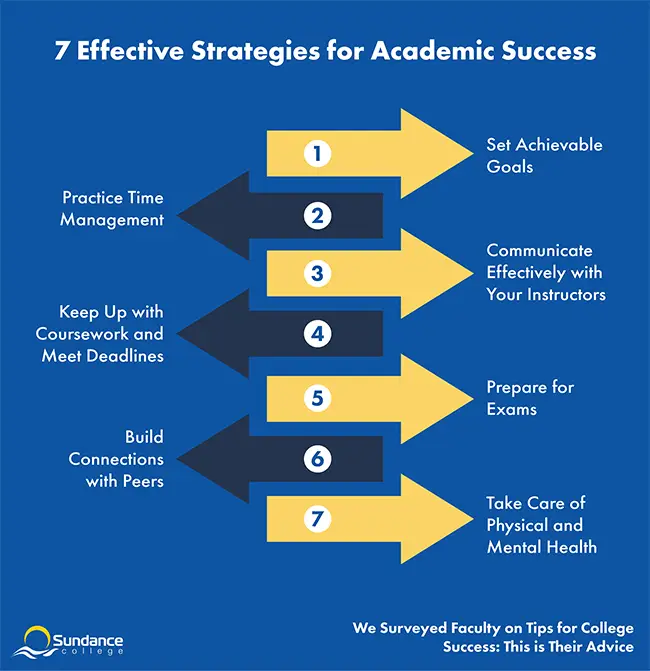Blog / We Surveyed Faculty on Tips for College Success: This Is Their Advice
We Surveyed Faculty on Tips for College Success: This Is Their Advice

Explore our Diploma Programs
- Business, Hospitality, and Legal
- Health and Human Services
- Technology
Table of Contents
Success in college is the key to a successful career. To land a job in your new field, you will need to gain the necessary skills and knowledge from your program and, of course, graduate with your college diploma. However, many students heading back to school often find themselves unsure of where to start or how to manage their learning journey effectively.
To help you navigate this path, we surveyed our education team on their top tips for students. In this article, we share their valuable advice on how you can achieve success at each stage of your program, from orientation week to completing your practicum.
You’ll find tips on balancing commitments, meeting academic goals, participating in the college community, and excelling in your practicum – so you can graduate job-ready with a stellar academic record.
Preparing for Your Learning Journey

Starting a career college diploma program brings forth the excitement of new opportunities, but it also requires careful preparation to ensure a smooth transition into the learning process.
Get organized before your program begins by completing the following steps:
Schedule Your College Study Routine
First, choose a calendar that best fits you (it could be physical, such as a day planner, or digital, such as a smartphone app). Put in your non-negotiable commitments, like work and family commitments. Then schedule time each week to focus on schoolwork.
Laura, Sundance Assistant Education Manager (AEM), recommends scheduling 30 hours per week in your calendar to start (you can adjust to more or less time once you get a feel for what you require to be successful). Keep in mind that you’ll likely need a minimum of 25 minutes to fully engage in a subject, and that most people have a maximum focus of 3-4 hours. So, it’s a good idea to schedule study sessions that are between 25 minutes and 4 hours – any more or less time in one block will not be as efficient.
Make The Most Out Of Orientation Sessions
Colleges may offer an orientation session to help you make the transition to post-secondary education. For example, the orientation at Sundance College covers:
- different learning styles
- goal setting methods
- memory-improving tips
- effective note-taking strategies
- testing types
During your orientation week, you can ask all the questions you may have about the college’s policies, procedures, and resources available to support your studying process. Moreover, it is a great opportunity to connect with your fellow students and build long-lasting relationships.
Appeal To Technical Support
Before your program or course begins, ensure you have access to a stable internet connection and a working laptop. Sundance General Business Management program (GBM) Instructor, Michelle also recommends signing into any online platforms you’ll need, to make sure everything works smoothly from your end.
At Sundance College, technical support is available remotely or in-person. Whether you are at one of our campuses or you contact support from home, our technical support assistants can help you set up a Zoom account, troubleshoot login issues – and will provide any other technical assistance you require.
Create Your Ideal Learning Environment
Define a place – or places – where you’ll be able to concentrate on studying and assignments. A cozy corner in your living room, the kitchen table after your kids go to sleep, or a local coffee shop on weekends – whatever place you choose, it should make you feel comfortable and ready to learn.
Build A Support Network
To successfully balance school with other life obligations, it will be useful to enlist the support of your family, colleagues, and friends. Laura, AEM, suggests asking yourself:
- What is your family situation? Do you have family commitments that will limit the amount of time you’re able to focus on school? Do you have family and friends that can support your needs as a student (for example, will someone in your support network look after your children while you are writing an exam so you can concentrate)?
- What is your work situation? How might your work situation affect your ability to be a successful student? Are your work hours regular or predictable? Is your employer supportive of you enrolling in school, and will they be flexible with your work schedule if you need to request fewer shifts or specific days off?
Start by having an honest conversation with your loved ones. Explain your goals and the challenges you expect to face, such as time management, program demands, and balancing work and study. This conversation can help you set expectations and lay the foundation for a supportive network.
Next, enlist the support of your colleagues and employer. Discuss your school schedule and the demands it may place on your work schedule. Consider discussing flexible work arrangements, such as telecommuting or adjusting your hours to allow for study time. Many employers recognize the value of education and may be willing to support your efforts.
Excelling in Your Diploma Program

Once you complete the onboarding process, it’s essential to adopt effective strategies and habits that will set you up for academic success.

Set Achievable Goals
Take the time to define your objectives, both short-term and long-term. As Jay, one of our Addictions and Community Health Professional (ACHP) program instructors says, you should not only clarify goals within each class and for your diploma but also set goals for your career as well. Think: What specific skills do you want to acquire? What career path are you aiming for?
One effective approach to setting realistic goals is using the SMART framework, where SMART stands for Specific, Measurable, Achievable, Relevant, and Time-bound. For example, the goal “Enhance my public speaking abilities by delivering three presentations with confidence within the next two months” meets the criteria set by the SMART framework.
Practice Time Management
Effective time management is a vital skill for success in a diploma program, and having a calendar at hand is only the first step to staying organized. Here are more tips from GBM instructor, Michelle:
- Review the outline that is given in each course class to determine what the day-to-day expectations are to stay on track.
- Define whether there are any assignments or case studies that will require a little bit more time to complete.
- Break down tasks into smaller, manageable chunks and prioritize them accordingly.
Communicate Effectively With Your Instructors
Maintaining open lines of communication with your instructors is immensely important for your academic success. Here are some recommendations from our education team:
- Contact your instructor right away if you need help with an assignment or have a scheduling conflict. It’s easier to help students with prior notice.
- Ask for a one-on-one meeting if you are unsure of a topic or the material that was just covered.
- Advocate for yourself. If there is something you feel you need to be successful – ask for it! Your instructor is there to support you, but they don’t always know exactly what you need… so tell them! If it’s within your instructor’s ability, they will likely be happy to help.
Keep Up With Coursework And Meet Deadlines
To keep up with your studies, it is important to proactively manage your workload, which will help you avoid last-minute stress and produce high-quality work. “Make sure you are using your time wisely; avoid becoming a weekend warrior trying to complete five days’ worth of class work on a Saturday,” advises GBM instructor, Michelle.
What can additionally help you here is learning how to “study smarter, not harder.” Here are some tips from Assistant Education Manager, Laura, to help you optimize your learning process:
- Learning strategies are skills – that means you can get better at them with thoughtful practice! Take the time to research and explore various studying techniques or engage in discussions with your instructor and classmates.
- Textbooks are not designed to be read cover-to-cover the way you’d read a novel. Practice good ‘active reading’ strategies. For example: Make good use of all the different parts of your textbook, including the table of contents, glossary, index, and review questions. Practice the ‘THIEVES’ pre-reading strategy.
- As a college student, you’re expected to absorb lots of new information very quickly. Keeping your notes clear and organized will help you track everything you’re learning – and make your life much easier when it’s time for exams. The Cornell Notes template is one note-taking approach our students have found useful – try it out for yourself!
By following these strategies, you can maintain a balanced workload, effectively absorb and retain information, and avoid the stress associated with last-minute cramming.
Prepare For Exams
Preparing for exams requires a strategic approach. ACHP Instructor Jay highlights that knowing and understanding how you learn is the key to being able to retain and recall the information you are learning.
First, know that at Sundance College, instructors record their lectures, so you can rewatch the lecture when you need, this will help with the retention of the material.
In addition, Laura, AEM suggests that students:
- Use a variety of study strategies from across different learning styles (visual, auditory, verbal, kinesthetic) to engage your ‘whole brain’ in the learning process.
- Make sure to incorporate study strategies that use active recall and require you to retrieve information, as this simulates a test environment and is a great way to prepare for exams.
- Make effective use of course resources such as practice tests.
Your exam preparation strategies should also include looking at when your tests and assessments are scheduled far ahead of time, and noting what material will be covered in each assessment.
Build Connections With Peers
Building connections with your peers can enhance your learning experience. Engage in group projects, participate in study groups, and contribute to class discussions. Collaborating with classmates will allow you to gain diverse perspectives, exchange ideas, and support one another throughout the program. These connections can also extend beyond the classroom and potentially lead to valuable professional networks in the future.
Take Care Of Physical And Mental Health
Healthy eating habits, getting enough sleep, incorporating some physical activity and fitness into your day, managing your stress, taking time for relaxation and hobbies, and staying optimistic can all have a direct impact on your memory and ability to learn!
So, take care of your physical and mental wellbeing as much as possible!
Achieving Practicum Success
Toward the end of any Sundance College diploma program, there are several weeks allocated to practicum experience where you will be able to hone the knowledge and skills acquired during your academic classes. To make the most of your practicum and set yourself up for success, consider the following strategies:
Find Opportunities For Networking And Professional Development
During your practicum, seize opportunities to network and engage in professional development activities. This involves attending different industry events, seminars, and workshops to expand your knowledge and connect with professionals in your field. We all know that building a strong professional network can open doors to rewarding job opportunities – so use it to your advantage.
Get To Know Your Co-Workers
Building relationships with your co-workers during your practicum can significantly enhance your experience. Take the initiative to introduce yourself, learn about their roles and responsibilities, and ask for advice or insights. Engaging with your colleagues fosters a positive and supportive work environment and can lead to valuable mentorship opportunities.
Accept Constructive Feedback
During your practicum, be open to receiving constructive feedback from your supervisors and colleagues. Take it as an opportunity to learn and develop your skills. Actively listen to feedback, ask clarifying questions, and take steps to implement suggested improvements. Demonstrating your thirst to learn and grow will not only benefit your current practicum but also contribute to your professional development in the long run.
Add Your Practical Experience To Your Resume
The experience you gain during your practicum is an asset that you can use to impress potential employers. When showcasing your practical experience, consider the following tips:
- Highlight specific projects or tasks you completed during the practicum that demonstrate your abilities and accomplishments.
- Incorporate industry-specific terminology and keywords to showcase your understanding of the field. (But still keep your resume clear and easy-to-read.)
- Include positive feedback or recognition you received during your practicum – and ask your practicum supervisor if you can use them as a reference.
Remember, your practicum is not just a requirement to fulfill—it is a valuable chance to apply your skills, gain industry insights, and establish connections that can shape your future career path.
Take a Closer Look at Sundance College as Your Educational Partner
At Sundance College, we understand that the journey of learning can be challenging, but we are dedicated to supporting our students every step of the way. Our commitment to their success is reflected in the words of Laura, Assistant Education Manager:
“We notice that our most successful students are the ones who embrace the challenge of learning and seek opportunities to engage – they ask instructors for help, schedule study groups with their classmates, keep reading/practicing/reviewing — and their hard work pays off before our eyes!”
Ready to begin working toward your educational and career goals? Fill out this form to start a consultation with one of our advisors, and let our team lead you to your dream career and brighter future!
Subscribe for more career advice
Blog Categories
Share on:
